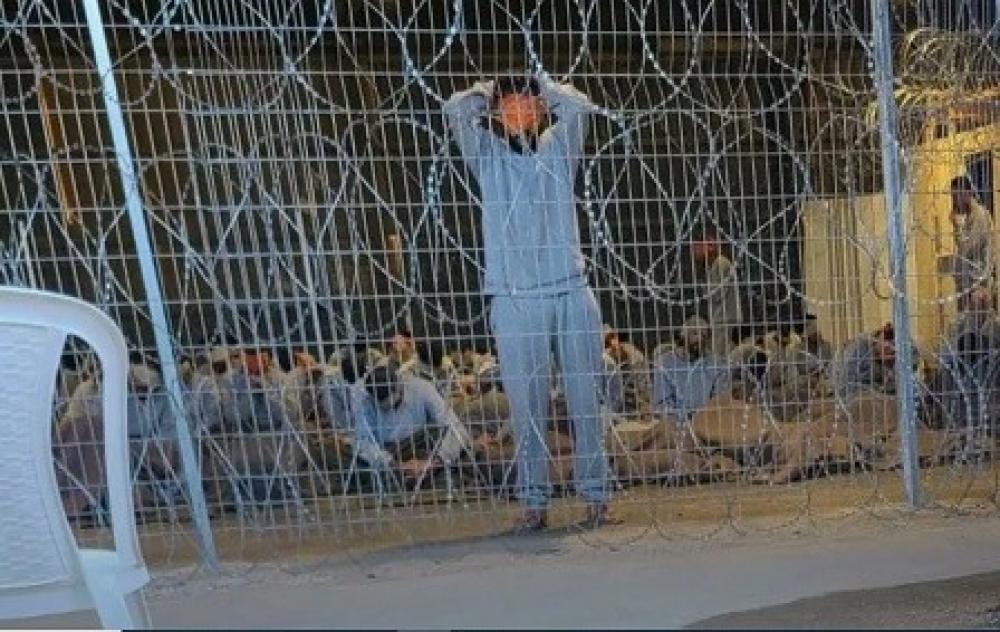Ramallah – Saba:
The Palestinian prisoners' institutions (the Commission of Prisoners' and Ex-Prisoners' Affairs, the Palestinian Prisoners' Club, and Addameer Prisoner Support and Human Rights Association) stated that the Israeli occupation authorities continue to escalate the systematic use of torture crimes against prisoners and detainees in prisons and camps, which have been transformed into torture arenas.
The institutions added in a joint statement, issued Thursday, on the occasion of the International Day in Support of Victims of Torture, that the post-genocide period marked a turning point in assessing the scale of crimes committed by the Israeli occupation authorities and their various agencies, and the serious repercussions of the widespread use of this crime, which has led to the martyrdom of dozens of detainees and prisoners, making this the bloodiest period in the history of the prisoner movement, according to the Palestinian Safa News Agency.
The Institutions noted that since the beginning of the genocide, the relevant institutions have obtained dozens of testimonies and testimonies reflecting the escalation of torture crimes, beginning with the moment of arrest, through the investigation phase, which is the most prominent stage in the commission of these crimes, and continuing into prisons where these practices continue through various policies and tools.
They indicated that the policy of torture is no longer limited to the investigation phase for the purpose of extracting confessions. Rather, the enemy has devised methods and tools that have contributed to entrenching this crime in the details of prisoners' daily lives, and this has become more prominent in an unprecedented manner since the beginning of the genocide.
The Institutions stated that with the escalation of arrest campaigns and field investigations, which have affected thousands of citizens, including women and children, torture has witnessed an unprecedented escalation in terms of level and intensity. The testimonies of detainees and released prisoners provide vivid evidence of these crimes, along with the psychological effects these policies have had on them.
Palestinian prisoners' organizations explained that detainees' testimonies reflected multiple methods of psychological and physical torture, beginning with brutal arrest and continuing with systematic intimidation, severe beatings, and painful restraints, which led to serious complications, including amputation of limbs for some detainees, particularly those from Gaza.
They noted that torture methods included: shabeh (stress position), crucifixion, electrocution, dousing with scalding water, the use of corrosive chemicals, nail removal, prolonged interrogation accompanied by deprivation of sleep, food, water, and toilet facilities, the use of loud noises (such as disco music), the "diaper" policy, and soldiers urinating on food and water, and even on detainees themselves.
The Institutions reported that the humiliating and degrading detention conditions contributed to the entrenchment of torture crimes, including the escalation of sexual crimes after the genocide and rape crimes, which resulted in serious injuries, including fractures and denial of medical treatment.
They confirmed that they had documented dozens of cases, especially since the beginning of the genocide. Prisons witnessed brutal repression, in which enemy forces used batons, electric shock devices, and police dogs, forcing prisoners to undress and assaulting them for hours in prison courtyards.
The Institutions indicated that diseases and epidemics have become a systematic tool of torture, with detainees left untreated. One example of this is scabies, which detainees suffer from around the clock, leading to severe pain and an inability to meet their needs.
The number of prisoners and detainees in Israeli enemy prisons exceeds 10,400, including 47 female prisoners, more than 440 children, 3,562 administrative detainees, and 2,214 detainees from Gaza, whom the enemy classifies as "unlawful combatants." These figures do not include detainees in Israeli enemy military camps, which are estimated to number in the hundreds.
Since the beginning of the aggression on the Gaza Strip, 72 detainees have been martyred in enemy prisons and camps, and their identities have been announced. Meanwhile, dozens of detainees in Gaza remain subject to the crime of enforced disappearance.

| more of (International) |




